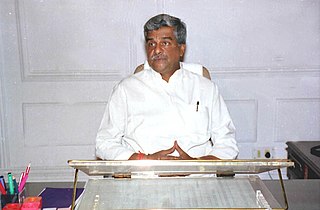
The Central Bureau of Investigation (CBI) is the domestic crime investigating agency of India. It operates under the jurisdiction of the Ministry of Personnel, Public Grievances and Pensions. Originally set up to investigate bribery and governmental corruption, in 1965 it received expanded jurisdiction to investigate breaches of central laws enforceable by the Government of India, multi-state organised crime, multi-agency or international cases. The CBI has attracted numerous controversies and criticisms due to various reports of irregular practises, excessive political influence, and a poor conviction rate. CBI is exempted from the provisions of the Right to Information Act. CBI is India's officially designated single point of contact for liaison with the Interpol.

Senayangba Chubatoshi Jamir is an Indian politician and former Governor of Odisha. He was Parliamentary Secretary to Pandit Jawaharlal Nehru and Deputy Minister under Indira Gandhi. He has served as the Chief Minister of Nagaland, Governor of Maharashtra, Governor of Gujarat & Governor of Goa. He was awarded the third-highest Civilian Award in India, Padma Bhusan in 2020 for his work in public affairs.
Mahatma Gandhi National Rural Employment Guarantee Act 2005 or MGNREGA, earlier known as the National Rural Employment Guarantee Act or NREGA, is an Indian social welfare measure that aims to guarantee the 'right to work'. This act was passed on 23 August 2005 and was implemented in February 2006 under the UPA government of Prime Minister Manmohan Singh following tabling of the bill in parliament by the Minister for Rural Development Raghuvansh Prasad Singh.

Indian Audit and Accounts Service (IA&AS) is a group 'A' central civil service under the Comptroller and Auditor General of India, the supreme audit institution of India. Its central civil servants serve in an audit managerial capacity in the Indian Audit and Accounts Department (IA&AD), and are responsible for auditing the accounts of the Union government and state governments, as well as their public commercial enterprises and non-commercial autonomous bodies. The service's role is analogous to the US Government Accountability Office and the UK National Audit Office.

Sriprakash Jaiswal, also written Shriprakash or Sri Prakash, is an Indian politician. He served as a member of Parliament for the Indian National Congress and as Minister of State for Home Affairs. He also held ministry of coal for three years, 2011–2014.

Andimuthu Raja is an Indian politician from Tamil Nadu, who serves as Member of Parliament for the Nilgiris constituency and deputy general secretary for the Dravida Munnetra Kazhagam. He was a member of the 15th Lok Sabha representing the Nilgiris constituency of Tamil Nadu and had been elected to house four times since 1996. Raja is an advocate by profession and he did his master's degree from Government Law College in Tiruchirappalli.

Vinod Rai is a former IAS officer who served as the 11th Comptroller and Auditor General of India. He assumed office on 7 January 2008 till 22 May 2013. He is the current chairman of UN Panel of External Auditors and Honorary Advisor to the Indian Railways and a member of the Railway Kaya Kalp Council.
The Satyam Computer Services scandal was India's largest corporate fraud until 2010. The founder and directors of India-based outsourcing company Satyam Computer Services, falsified the accounts, inflated the share price, and stole large sums from the company. Much of this was invested in property. The swindle was discovered in late 2008 when the Hyderabad property market collapsed, leaving a trail back to Satyam. The scandal was brought to light in 2009 when chairman Byrraju Ramalinga Raju confessed that the company's accounts had been falsified.
In India, the Department of Telecommunications (DoT) conducts auctions of licenses for electromagnetic spectrum. India was among the early adopters of spectrum auctions beginning auctions in 1994.
Mining scams in India refers to a series of alleged widespread scams in various ore-rich states of India, which has generated controversy. Such issues span encroachment of forest areas, underpayment of government royalties, and conflict with tribals regarding land rights. The spill-over of the effects of legal mining into issues such as Naxalism and the distortion of the Indian political system by mixed politics and mining interests, has gained international attention.
The 2G spectrum case was a political controversy in which politicians and private officials of the United Progressive Alliance (UPA) coalition government India were allegedly involved in selling or allotting 122 2G spectrum licenses on conditions that provided an advantage to specific telecom operators. A. Raja, then Telecom Minister, was accused of selling 2G spectrum licenses at a very low cost which resulted in the loss of ₹1,760 billion in government revenue. Raja was also accused of not following rules and regulations as well as not recognizing any advice from the Ministries of Finance and Law and Justice of India while allotting 2G spectrum licenses to telecom operators. Series of allegations were made on allotting 2G spectrum licenses including allegations from Central Bureau of Investigation after investigating the case alleging Raja for intentionally advancing the cut-off date to favour some specific firms, which were allegedly ineligible for applying for telecom licenses, in return for bribes.
The Public Accounts Committee (PAC) is a committee of selected members of parliament, constituted by the Parliament of India, for the purpose of auditing the revenue and the expenditure of the Government of India. They check that parliament exercises over the executive stems from the basic principle that parliament embodies the will of the people. This committee along with the Estimates committee (EC) and Committee on Public Undertakings (COPU) are the three financial standing committees of the Parliament of India.

The Office of the Comptroller and Auditor General of Bangladesh (C&AG) is the Supreme Audit Institution (SAI) of the country. Like the SAIs in many other countries across the world the institution is established by the Constitution of Bangladesh. This institute is responsible for maintaining accounts of the republic and audits all receipts and expenditure of the Government of Bangladesh, including those of bodies and authorities substantially financed by the government. The reports of the CAG are discussed by the Public Accounts Committee, which is a standing committee in the Parliament of Bangladesh.
The Coal allocation scam, dubbed in media as Coalgate, is a major political scandal concerning the Indian government's allocation of the nation's coal deposits to public sector enterprise (PSEs) and private companies. In a draft report issued in March 2012, the Comptroller and Auditor General of India (CAG) office accused the Government of India of allocating coal blocks in an inefficient manner during the period 2004–2009. Over the Summer of 2012, resulting in a Central Bureau of Investigation probe into whether the allocation of the coal blocks was in fact influenced by corruption.
DIAL Scam, also called Delhi Airport Land Scam, Airport Scam and the IGI Scam is a title popularly used in the media to refer to the irregularities pointed out in a report titled Implementation of Public – Private Partnership at Indira Gandhi International Airport, Delhi tabled on 17 August 2012 by the Comptroller and Auditor General of India (CAG). According to this report, 1.63 lakh crore was lost by the Indian exchequer due to a deal entered between the Airports Authority of India and DIAL for the lease of land.

Also referred to as the AgustaWestland VVIP chopper deal, the Indian helicopter bribery scandal by Congress led UPA Government refers to a multimillion-dollar corruption case in India, wherein money was paid to middlemen and Indian officials in 2006 and 2007 to purchase helicopters for high level politicians. As per the CBI, this amounted to ₹2.5 billion (US$31 million), transferred through bank accounts in the UK and UAE.

Shashi Kant Sharma is a retired central civil servant of 1976 batch under IAS cadre belonging to Bihar. He was the Comptroller and Auditor General of India. In July 2014 he assumed office as a Member of the United Nations Board of Auditors. On 11 January 2017, Sharma took over as the Chairman of the United Nations Board of Auditors. The reports of the Board serve as a key input for policy making within the UN.

Sanjay Jain is a prominent Indian lawyer and former Additional Solicitor General of India. His legal career is marked by significant contributions to various fields of law, including constitutional issues, taxation, insolvency and public interest litigation.
The Prime Minister's Citizen Assistance and Relief in Emergency Situations Fund was created on 27 March 2020, following the COVID-19 pandemic in India. Although it is named for the Prime Minister of India, and uses the State Emblem of India, it is a private fund, used at the discretion of the Prime Minister and the Fund's trustees, and does not form a part of the Government of India's accounts. The Fund was established for the purpose of redressing the COVID-19 pandemic in India, in 2020. While complete documentation for the Fund's establishment has not been made public, the Government of India has stated that the Prime Minister of India, Narendra Modi, is the chairman of the fund, and that trustees include the Minister of Defence, Rajnath Singh; the Minister of Home Affairs, Amit Shah, the Minister of Finance, Nirmala Sitharaman, and several corporate leaders and industrialists, including Ratan Tata, and Sudha Murty.




















